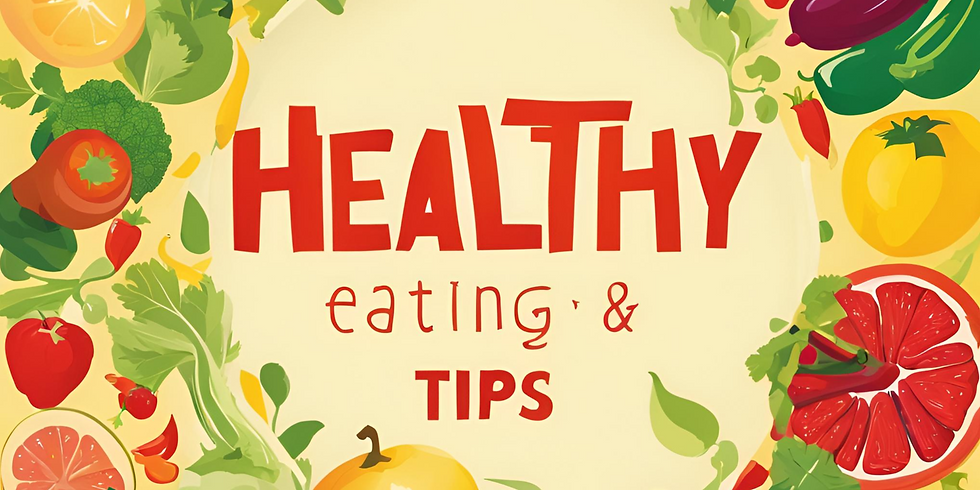Decoding Nutrition: What You Need to Know
- Virtual Nutritionist

- Nov 2, 2024
- 7 min read
Updated: May 24
Welcome to Decoding Nutrition, where we break down the essential elements of nutrition to help you understand how it impacts your health and well-being. In today’s fast-paced world, it's easy to get lost in the sea of dietary advice and trends. Our goal is to simplify the science of nutrition and provide you with clear, actionable insights.

What is Nutrition?
At its core, nutrition is the study of how food impacts our bodies, encompassing the processes of consumption, digestion, absorption, and nutrient utilization. Understanding nutrition is essential for maintaining overall health, supporting vital bodily functions, and preventing chronic diseases. By exploring how different foods contribute to our well-being and recognizing the importance of balanced dietary choices, we can empower ourselves to make informed decisions that enhance our health and vitality.
Nutrients: The Building Blocks of Nutrition
Nutrients are essential substances that our bodies need to function properly. They provide the energy we require to carry out daily activities and support overall health. Here’s a closer look at the main types of nutrients and what they do:
Macronutrients are the key nutrients that provide the energy necessary for our bodies to function. Unlike micronutrients, which are needed in smaller amounts, macronutrients are required in larger quantities to support growth, metabolism, and overall health. There are three primary categories of macronutrients; Carbohydrates, Proteins, Fats

1. Carbohydrates: Your Energy Source
Carbohydrates are the body’s primary source of energy. They break down into glucose, which fuels our cells, tissues, and organs. There are two main types:
Simple Carbohydrates: Found in fruits, honey, and refined sugars, they provide quick energy.
Complex Carbohydrates: Found in whole grains, legumes, and vegetables, they offer sustained energy and fiber, which aids digestion.

2. Proteins: The Body’s Building Blocks
Proteins are made up of amino acids and are crucial for building and repairing tissues. They play a key role in producing enzymes and hormones, as well as supporting immune function. Good sources of protein include:
Meat, fish, and poultry
Eggs
Dairy products
Legumes and nuts

3. Fats: Essential for Health
Fats are often misunderstood but are vital for our health. They provide a concentrated source of energy and help absorb fat-soluble vitamins (A, D, E, and K). There are different types of fats:
Unsaturated Fats: Found in olive oil, avocados, and nuts, these are heart-healthy.
Saturated Fats: Found in animal products and some tropical oils; moderation is key.
Trans Fats: Often found in processed foods, these should be avoided as much as possible.
Micronutrients, though needed in small amounts, play a crucial role in maintaining our overall health. Comprising vitamins and minerals, they support vital bodily functions, from energy production to immune response. Understanding these essential nutrients can help you make informed dietary choices for better health and well-being.Micronutrients are Vitamins and Minerals
Vitamins are vital organic compounds that our bodies need in small amounts to function optimally. Despite their tiny quantities, these nutrients play significant roles in maintaining overall health, supporting everything from immune function to energy production. With various vitamins each contributing uniquely to our well-being, understanding their functions and sources is crucial for making informed dietary choices.

Essential Vitamins: Key Functions and Rich Sources
Vitamin A
Function: Supports vision and immune function.
Sources: Carrots, sweet potatoes, spinach.
Vitamin B
Function: Involved in energy metabolism and nerve function.
Sources: Whole grains, meat, eggs, legumes.
Vitamin C
Function: Acts as an antioxidant and supports immune health.
Sources: Citrus fruits, strawberries, bell peppers.
Vitamin D
Function: Important for bone health and calcium absorption.
Sources: Sunlight, fatty fish, fortified dairy products.
Vitamin E
Function: Acts as an antioxidant and protects cell membranes.
Sources: Nuts, seeds, spinach, broccoli.
Minerals are inorganic nutrients that play a crucial role in maintaining various bodily functions and overall health. Unlike macronutrients, which provide energy, minerals are essential for a wide range of physiological processes, including building strong bones, transmitting nerve impulses, and regulating metabolism.
Minerals cannot be produced by the body, so they must be obtained through the diet. They are found in a variety of foods, including fruits, vegetables, nuts, seeds, whole grains, and animal products.
Macrominerals:
These are minerals that the body needs in larger quantities. They include:
Calcium: Vital for strong bones and teeth, muscle function, and nerve signaling. Sources include dairy products, leafy greens, and fortified foods.
Potassium: Important for maintaining fluid balance, muscle contractions, and nerve function. Found in bananas, oranges, potatoes, and spinach.
Magnesium: Plays a role in over 300 biochemical reactions in the body, including energy production and muscle function. Sources include nuts, seeds, whole grains, and green leafy vegetables.
Trace Minerals:
These minerals are required in much smaller amounts but are equally essential for various bodily functions. They include:
Iron: Crucial for the formation of hemoglobin, which carries oxygen in the blood. Found in red meat, beans, lentils, and fortified cereals.
Zinc: Important for immune function, wound healing, and DNA synthesis. Sources include meat, shellfish, legumes, and seeds.
Selenium: Acts as an antioxidant and supports thyroid function. Found in Brazil nuts, seafood, and whole grains.
The Role of Water
Importance of Hydration
Essential for Life: Water is vital for survival, as it makes up a significant portion of our body weight (about 60% in adults).
Hydration and Performance: Proper hydration is crucial for physical performance, cognitive function, and overall health. Even mild dehydration can impair these functions.

Dietary Patterns: Building a Foundation for Health
Importance of Balanced DietsA balanced diet is essential for overall health and well-being. It provides the necessary nutrients that our bodies need to function optimally, supporting everything from growth and development to immune function. A varied diet not only ensures nutritional adequacy but also plays a significant role in disease prevention, reducing the risk of chronic conditions such as heart disease, diabetes, and certain cancers. Moreover, maintaining a balanced diet aids in effective weight management and enhances physical, mental, and emotional well-being.
Overview of Food GroupsTo create a balanced diet, it's important to include a variety of food groups:
Fruits and Vegetables: Rich in vitamins, minerals, fiber, and antioxidants, these foods should be consumed in a colorful array for maximum health benefits.
Whole Grains: Provide essential carbohydrates, fiber, and B vitamins. Opt for brown rice, quinoa, and whole grain bread to nourish your body.
Proteins: Crucial for growth and repair, good sources include lean meats, fish, eggs, legumes, nuts, and seeds.
Dairy or Dairy Alternatives: Important for calcium and vitamin D intake, choose options like milk, yogurt, and fortified plant-based alternatives.
Healthy Fats: Necessary for hormone production and nutrient absorption, incorporate avocados, olive oil, nuts, and fatty fish into your meals.
Examples of Healthy Eating Patterns
Mediterranean Diet: This diet emphasizes whole foods such as fruits, vegetables, whole grains, legumes, nuts, and healthy fats like olive oil. It encourages moderate fish consumption and limits red meat and processed foods. The Mediterranean diet is associated with numerous health benefits, including a reduced risk of heart disease.
Plant-Based Diet: Focusing on whole, minimally processed plant foods, this diet includes fruits, vegetables, grains, legumes, nuts, and seeds. A plant-based approach promotes weight management and supports overall health while being environmentally sustainable.
DASH Diet (Dietary Approaches to Stop Hypertension): Designed to help combat high blood pressure, the DASH diet emphasizes fruits, vegetables, whole grains, lean proteins, and low-fat dairy, while limiting sodium and saturated fats.
By incorporating a variety of foods from these groups and following healthy eating patterns, you can create a balanced diet that supports your overall health and well-being. Embrace the journey of nutritious eating, and enjoy the vibrant flavors and benefits that come with it!
Tips for Healthy Eating: Practical Advice for Balanced Nutrition

Plan Your Meals:
Weekly Meal Prep: Set aside time each week to plan your meals and snacks. This helps ensure you have healthy options on hand and reduces the temptation to reach for processed foods.
Create a Shopping List: Based on your meal plan, make a grocery list to keep you focused while shopping, and stick to it to avoid impulse buys.
Prioritize Whole Foods:
Choose whole, minimally processed foods whenever possible. Fill your plate with fruits, vegetables, whole grains, lean proteins, and healthy fats for optimal nutrition.
Practice Mindful Eating:
Pay attention to your hunger and fullness cues. Eat slowly, savoring each bite, and avoid distractions like screens during meals to enhance your awareness of portion sizes and enjoyment.
Portion Control:
Use smaller plates and bowls to help manage portion sizes. This can prevent overeating while still allowing you to enjoy a variety of foods.
Snack Wisely:
Choose healthy snacks like fruits, nuts, yogurt, or whole-grain crackers to keep your energy levels stable between meals and avoid unhealthy choices.
Stay Hydrated:
Drink plenty of water throughout the day. Keeping a reusable water bottle handy can remind you to stay hydrated and can also help reduce the consumption of sugary drinks.
Experiment with Recipes:
Try new healthy recipes to keep your meals interesting. Incorporate seasonal fruits and vegetables for freshness and variety.
Listen to Your Body:
Recognize the difference between physical hunger and emotional eating. When you feel the urge to eat, ask yourself if you’re truly hungry or if you’re eating out of boredom or stress.
Get Creative with Leftovers:
Use leftovers creatively to reduce food waste. Transform yesterday’s dinner into a new meal, like adding roasted vegetables to a salad or using grains in a stir-fry.
Seek Support and Resources:Consider consulting a registered dietitian for personalized advice and support. There are also many online resources, apps, and communities focused on healthy eating that can provide inspiration and guidance.
By incorporating these practical tips into your daily routine, you can cultivate balanced nutrition and make healthier choices that contribute to your overall well-being. Enjoy the journey to a healthier lifestyle!
**Thanks for Reading!**

Commentaires